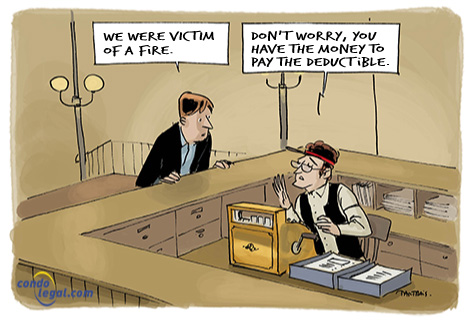19 Articles

The additional premium is a premium that is added to the existing premium. It results from a worsening of the risk or from the assumption of a new risk. This additional premium may be imposed during the course of a contract or upon its renewal. Risks are analyzed according to scales that are specific to each insurer. Ultimately, the syndicate will pay this additional premium, which will be charged to all of the co-owners through…...

In the event of a loss, it is imperative for the insured, whether a co-owner or a director of a co-ownership syndicate, to report the incident to their insurer as soon as possible. This declaration generally triggers the designation of a claims adjuster by the insurer. This professional is responsible for assisting the insured throughout the claims process, assessing the damages, advising on measures to take, and facilitating administrative procedures. Investigating the circumstances of a…...

Most insurance policies include deductibles, with amounts varying based on the insured risk. For example, the deductible for water damage is generally higher than that for fires. The purpose of the deductible is to make the insured responsible by having them cover part of the repair costs for damages caused by the incident. For the syndicate, the advantage lies in reduced premiums, while also encouraging the prevention of incidents. For a community of co-owners, this deductible…...

The insurance premium is the amount that the insured must pay, either monthly or annually, to benefit from the coverage provided by the iinsurance policy in case of a loss. It is a cost associated with the maintenance, upkeep, and administration of the building. Although the co-ownership syndicate is responsible for covering this cost, the resulting expenses are charged to the co-owners through their common expenses (condo fees). However, in recent years, there has been…...

Any co-ownership can one day face a major disaster. For example, a fire might ravage several units, or water damage might affect multiple floors due to a burst pipe. These situations lead to very high repair costs and are classified as "substantial loss". The financial burden can be overwhelming for individual co-owners and the syndicate. Managing the insurance indemnity by the board members can be extremely complex. Proper allocation of these funds requires careful planning…...

A co-ownership may face a multitude of risks such as fires, water damages, break-ins and acts of vandalism. In the event of a loss, the co-ownership's insurance plays an essential role in ensuring its sustainability and so, by covering not only the immovable itself but also the civil liability of the syndicate of co-owners. It is imperative for any syndicate to conclude a suitable insurance, a requirement stated in the Civil Code of Québec and reiterated by the majority…...

Syndicates of co-owners must set up a liquid and available short-term Self-Insurance Fund. The purpose of this fund is to anticipate and finance, in particular, expenses relating to the carrying out of future work following a disaster. This fund, mandatory under article 1071.1 of the Civil Code of Quebec, became necessary because of a substantial increase in (deductible) insurance deductibles. The amount of these deductibles was previously negligible most of the time, whereas today it…...

After being victims of a loss, the members of the board of directors and the affected co-owners are often caught off guard. How will things unfold? There is no need to worry or panic, because in principle, once the notice of loss completed, various stakeholders get involved: the insurer of the syndicate, but also that of co-owners and lessees, who will respectively designate their own claim adjuster. Generally the co-owners affected by a loss, as well…...

Claims in co-ownerships are numerous: water leaks, water damages, vandalism, fire, etc. If the claim affects both the common portions and private portions of the co-ownership, it is the responsibility of the board of directors to handle the notice of loss with the syndicate's insurer and to arrange for its repair. Effective management of a claim requires prompt and efficient actions to ensure that your building is repaired or rebuilt as quickly as possible. Here…...
